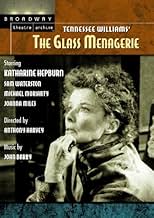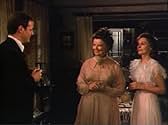Füge eine Handlung in deiner Sprache hinzuAmanda Wingfield dominates her children with her faded gentility and exaggerated tales of her Southern belle past. Her son plans escape; her daughter withdraws into a dream world. When a "ge... Alles lesenAmanda Wingfield dominates her children with her faded gentility and exaggerated tales of her Southern belle past. Her son plans escape; her daughter withdraws into a dream world. When a "gentleman caller" appears, things move to crisis point.Amanda Wingfield dominates her children with her faded gentility and exaggerated tales of her Southern belle past. Her son plans escape; her daughter withdraws into a dream world. When a "gentleman caller" appears, things move to crisis point.
- Regie
- Drehbuch
- Hauptbesetzung
- 4 Primetime Emmys gewonnen
- 4 Gewinne & 3 Nominierungen insgesamt
Empfohlene Bewertungen
To boot, if you're a fan of Katherine Hepburn, Sam Waterston, Michael Moriarty, or Joanna Miles - and what person in his right mind isn't a fan of all four? - then you need to be familiar with this production, which shows you not only the legendary Hepburn in an interestingly off-type role, but also three more of your favorite actors when they were budding.
Not that this production is perfect. Hepburn, as Amanda, dominates the action entirely too much for my taste, at times reducing the other characters to leaves swirling around the tempest she creates; Waterston sometimes alternates weirdly between a detached Hamlet-like cerebrality and raging tantrums worthy of a young Lear. In other words: the production does not well balance the two characters whose opponency is central to the drama. (It might be argued that Amanda is supposed to dominate the action, and that Tom is supposed to be wimpy, but I disagree. I think Tom's frustrated and repressed manhood needs to be portrayed in such a way as to convey a prodigious, if chained down, load of energy. Remember, this is a self-portrayal of the man who became Tennessee Williams!) True, if you concentrate you can catch some of the subtlety for which Waterston later became justly noted. But he is, so to speak, shouted down by Hepburn, who is entirely too much in focus. It is almost as if this production had been planned as a vehicle for her, and the character of Tom had been treated as a prop.
For my money, the real star of this show is Moriarty's masterful portrayal of the Gentleman Caller. Moriarty does not show us the power-tripping, manipulative bastard often associated with this role, but rather a nice guy who found himself in a compromising situation he never sought, and who tried naively to make the best of his ill-starred encounter with Laura, with the result that he bites off more than he can chew, and hurts Laura all the more by not intending it. The performance here really shines; I was very moved by his awkward feelings of guilt when he realizes his error.
Prior to watching this 1973 version with Katharine Hepburn, Sam Waterston, Michael Moriarty and Joanna Miles, there were two versions seen first. One was the 1987 version, which was my first filmed production of 'The Glass Menagerie'. The other was the Gertrude Lawrence and Jane Wyman film. Although the latter was a very respectable attempt despite the disappointing ending, the 1987 version is much better and of these three versions it's my favourite. This is a very worthy and really quite good production though where the detail and spirit is intact, with nothing toned down, nothing really tacked on and there isn't any re-ordering or re-working that affects any coherence (the case with the 80s TV film of 'Sweet Bird of Youth').
This production of 'The Glass Menagerie' is not perfect by all means. It is too dimly lit and makes the production a bit drab at times. Did feel that it could have opened up the drama more, the potential problem with television film adaptations of plays is being too much of a filmed play and being stagy, found that to be the case here.
In 'The Glass Menagerie', the dialogue is classic Williams. Just wished in this production that we had more time to hear it and take it all in and that the dialogue delivery wasn't as fast as it could be in places, especially with Katharine Hepburn.
However, lighting aside it is well and authentically designed and the photography isn't too intimate or distant. The audio adds to the atmosphere and doesn't jar with it. Despite the rushed line delivery at times, the dialogue may be talky but there is no denying its emotion. The staging also isn't perfect, but it's cohesive and just about avoids being over-heated and doesn't get dull. The ending like that of the play stays with you emotionally.
All four leads are hugely compelling with many moments of brilliance. Hepburn does indeed dominate but quite a lot of it is down to the character herself, she plays the heck out of the character and it's quite a towering portrayal overall regardless of some of the dialogue delivery and try-too-hard accent. Miles is very moving as Laura and pre-'Law and Order' Waterston is the embodiment of intensity. Moriarty is a different and interesting Jim and it was great to see a more likeable side.
Summing up, quite well done. 7/10
Later, Tom is sitting at a table writing. Amanda comes over and scolds him for his poor posture: "Now why can't you sit up straight I know what that position does to your internal organs. Now you sit up straight; here I'll show you. Your stomach pressed against your lungs, your lungs pressed against your heart, and that poor little heart gets discouraged 'cause it hasn't got any room left to go on beatin' for you".
But that's Amanda: an overbearing busybody who means well, but dominates those around her. She is so sure of herself and her moral values. Tom feels trapped, not only by his mother but also because of his mundane job at a warehouse. Daughter Laura is crippled and has a dreadful inferiority complex, which makes her shy. She identifies with her tiny glass animals, as fragile as she is.
Set almost entirely indoors in a drab little apartment in St. Louis, "The Glass Menagerie" is a play that conveys a lot of human feelings: anger, guilt, regret, dependency, and emotional damage. There's also a bit of humor. The story takes place during the WWII era of the 1940s. Eventually, Amanda imposes her wishes on Laura as well, as the mother badgers Tom to bring home a "gentleman caller" for Laura, in an effort to prevent Laura from being an old maid. What follows is both inspiring and heartrending.
The claustrophobic script is talky as one would expect for a play. The drab costumes are appropriate given the family's financial straits and the time period. Camera is largely static and functions mainly as a fly on the wall. Casting is very good. Acting is terrific. Hepburn does a wonderful job, except that she talks too fast for a Southern woman. The ending leaves viewers hanging.
With minor exceptions, the script and the performances are marvelous. Yet I'm not sure I would want to watch the film again; it is so depressing, especially toward the end.
Wusstest du schon
- WissenswertesTennessee Williams preferred this film version of his play over the 1950 one.
- Zitate
Amanda Wingfield: You are the only young man that I know of who ignores the fact that the future becomes the present, the present becomes the past, and the past turns into everlasting regret if you don't plan for it.
- VerbindungenFeatured in The 26th Annual Primetime Emmy Awards (1974)
Top-Auswahl
Details
- Erscheinungsdatum
- Herkunftsland
- Offizieller Standort
- Sprache
- Auch bekannt als
- Tennessee Williams' The Glass Menagerie
- Drehorte
- Produktionsfirma
- Weitere beteiligte Unternehmen bei IMDbPro anzeigen
Zu dieser Seite beitragen

























